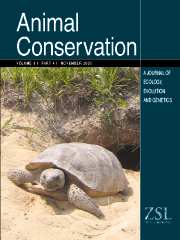Article contents
Pairing in mallards and American black ducks: a new view on population decline in American black ducks
Published online by Cambridge University Press: 30 March 2001
Abstract
Data on mating systems suggest that mate choice and dominance advantages by mallard (Anas platyrhynchos) males are not sufficient to explain declines in American black ducks (Anas rubripes). Courtship and pairing of mallards and American black ducks overwintering at a site on the Chesapeake Bay were studied from 1976–1993, during October–March. Mallards declined relative to American black ducks during this period at the study site. Courtship groups and pairs (one exception) consisted of conspecific individuals. Mallards and American black ducks segregated when courting but not when resting. Hybrid males joined courting groups of either species but did not pair successfully with either parental species. Handraised American black ducks hatched from eggs, imprinted on humans, and fledged at the study site, paired with American black ducks even though they were initially the rarer species. Handraised American black ducks avoided pairing with siblings. American black ducks and mallards pair assortatively and hybrids are selected against on the Chesapeake Bay. American black ducks may be declining due to human disturbance rather than due to direct interactions with mallards. Mallards may be increasing because they tolerate human disturbance and through direct release by humans into the American black duck's breeding range.
- Type
- Research Article
- Information
- Copyright
- © 1998 The Zoological Society of London
- 8
- Cited by


